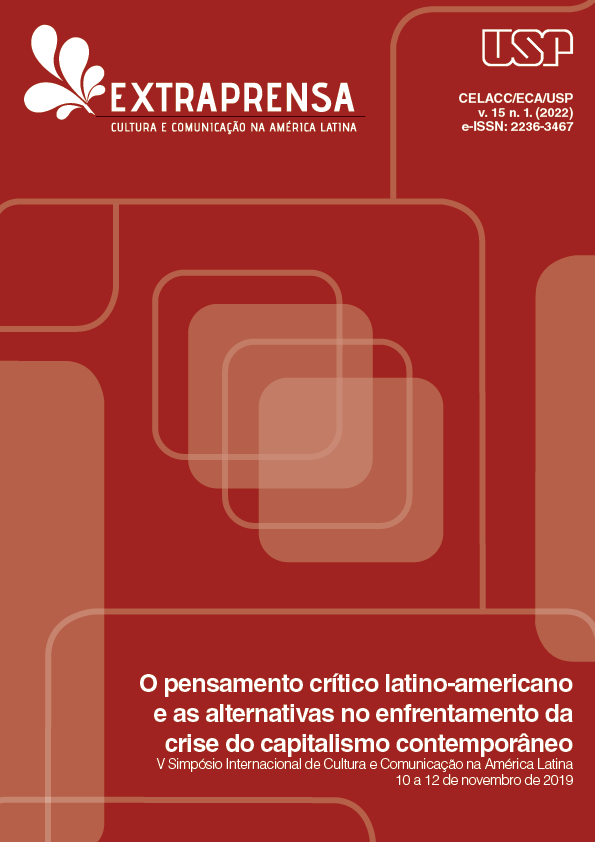The “cancel culture”: contributions from a sociological perspective
DOI:
https://doi.org/10.11606/extraprensa2022.194383Keywords:
Cancellation, Entertainment, Economic dependency, Social networks, CelebritiesAbstract
Cancel culture as a catch-all term, its abusive utilization to name different situations, its appropriation as a resource to identify any type of collective criticism of the behavior of celebrities on social networks, has led some to defend the inexistence of cancellation as a real social phenomenon, that is, endowed with particularities that distinguish it from mere criticism directed at others. It is a contemporary phenomenon, called "virtual lynching" by its critics, or activism and enlargement of democracy by its defenders, carried out by its executors, apparently, with the aim of problematizing behaviors incompatible, in most cases, with the fundamental values of identity diversity, that is, to expose, deconstruct and demand that racist, sexist, homophobic, transphobic, among others, which constitute dominant prejudices in an unequal society such as Brazil's, be not naturalized. Considering also that a subject is not canceled without the public execration being disseminated to all who want to know about the facts, since the purpose of the cancellation is precisely to reduce to a minimum the symbolic capital, with economic consequences and professionals, so that it serves as an example to deter potential future violators of prevailing ethical and moral norms, the real “cancellations” presuppose the participation of companies or any other economic agent and a relationship of dependence or subordination.
Keywords: Cancellation, entertainment, economic dependency, social networks, celebrities.
Downloads
References
BOURDIEU. Pierre. The forms of capital. Disponível em: https://home.iitk.ac.in/~amman/soc748/bourdieu_forms_of_capital.pdf. Acesso em: 27/10/2021.
BOURDIEU. Pierre. A economia das trocas linguísticas: o que falar quer dizer. 2. ed., 1ª reimpressão. – São Paulo: Editora da Universidade de São Paulo, 2008.
BOURDIEU. Pierre. Os usos sociais da ciência: por uma sociologia clínica do campo científico. São Paulo: Editora UNESP, 2004.
BORGES, Fábio Mariano. Consumerismo e consumidores indignados: netativismo contra as marcas nas redes sociais. (Doutorado em Ciências Sociais) PUC-SP, 2017, pp. 1-154.
CAMPANELLA. Bruno. Celebridade, engajamento humanitário e a formação do capital solidário. Disponível em: DOI:10.15448/1980-3729.2014.2.15908. Acesso em 27/10/2021.
CASTELLS Manuel. A sociedade em rede. 6° edição. São Paulo: Ed. Paz e Terra. 2002.
CARRERA. Fernanda. Marcas humanizadas: e suas interações sociais com consumidores no ambiente digital. Curitiba: Ed. Appris, 2018.
CUNHA. Simone Evangelista. Entre o glamour e o engajamento social: um estudo de caso sobre a performance de Anitta no Instagram durante a pandemia de Covid-19. Disponível em: https://doi.org/10.30962/ec.2168. Acesso em: 27/10/2021.
ENGLISH. Morgan. Cancel culture: an examination of cancel culture acts as a form of counterspeech to regulate hate speech online. Dissertação de mestrado. Publicado em 2021. Disponível em: https://doi.org/10.17615/k92h-zw67. Acesso em 27/10/2021.
FARIA, E. Redes sociais de fanfics entre os jovens. In: ROCHA, C.; SANTAELLA, L. (Org.). A onipresença dos jovens nas redes. Goiânia: FUNAPE/Media LAB/UFG, 2015. (p. 209-227).
HEINICH, Nathalie. De la visibilité: excellence et singularité en régime médiatique. Paris, Éditions Gallimard, 2012.
HONNETH. Axel. Luta por reconhecimento: a gramática moral dos conflitos. São Paulo. Ed. 34, 2003.
KARHAWI, Issaaf. Influenciadores digitais: o eu como mercadoria. In: Tendências em comunicação digital / organização Elizabeth Saad e Stefanie C. Silveira. São Paulo: ECA/USP, 2016.
MARTINS, José de Souza. Linchamentos: justiça popular no Brasil. São Paulo: Contexto, 2015 pp. 122-123, 125.
MARX, Karl & ENGELS, Friedrich. A Ideologia Alemã. São Paulo: Boitempo, 2007.
MERRIAM-WEBSTER DICTIONARY. Disponível em https://www.merriam-webster.com/words-at-play/cancel-culture-words-were-watching. Acesso em 09/10/2021.
MIQUETTI, Miqueli. O discurso da diversidade no universo corporativo: “institutos” empresariais de cultura e a conversão de capital econômico em poder político. Contemporânea v. 7, n. 1, pp. 119-146, jan-jun, 2017.
NORRIS, 2021- NORRIS, P., Cancel Culture: myth or reality. Revista: Political Studies, p. 1-30, 2021, disponível em: https://doi.org/10.1177/00323217211037023. Acesso em 10/10/ 2021.
OLIVEIRA. Valéria Brandini. A era das causas: o propósito como capital na estética publicitária. Relatório de Pós Doutorado. Universidade de São Paulo, São Paulo, 2015, pp. 1-145.
RABOUIN. Thibault. “Cancel culture”, a rhetorical construction. Disponível em: https://www.growthinktank.org/wp-content/uploads/2021/08/Cancel-culture-rhetoricalconstruction.pdf. Acesso em 27/10/2021.
SAINT-LOUIS, Hervé. Understanding cancel culture: normative and unequal sanctioning. First Monday, 26 (7). Disponível em: https://firstmonday.org/ojs/index.php/fm/article/view/10891. Acesso em 27/10/2021.
SORRIBES, Carles Pont & GUTIÉRREZ-RUBI, Antoni. Instagram en la estrategia de construcción de liderazgo político. Barcelona: Ed. Gedisa, 2020.
Downloads
Published
Versions
- 2024-03-12 (5)
- 2024-03-04 (4)
- 2022-08-23 (3)
- 2022-08-08 (2)
- 2022-05-31 (1)
Issue
Section
License
Copyright (c) 2022 Tamires de Assis Lima Martins, Ana Paula Cordeiro

This work is licensed under a Creative Commons Attribution-NonCommercial-NoDerivatives 4.0 International License.
Ao submeter qualquer material científico para Extraprensa, o autor, doravante criador, aceita licenciar seu trabalho dentro das atribuições do Creative Commons, na qual seu trabalho pode ser acessado e citado por outro autor em um eventual trabalho, porém obriga a manutenção de todos os autores que compõem a obra integral, inclusive aqueles que serviram de base para o primeiro.
Toda obra aqui publicada encontra-se titulada sob as seguintes categorias da Licença Creative Commons (by/nc/nd):
- Atribuição (de todos os autores que compõem a obra);
- Uso não comercial em quaisquer hipóteses;
- Proibição de obras derivadas (o trabalho não poderá ser reescrito por terceiros. Apenas textos originais são considerados);
- Distribuição, exibição e cópia ilimitada por qualquer meio, desde que nenhum custo financeiro seja repassado.
Em nenhuma ocasião a licença de Extraprensa poderá ser revertida para outro padrão, exceto uma nova atualização do sistema Creative Commons (a partir da versão 3.0). Em caso de não concordar com esta política de Direito Autoral, o autor não poderá publicar neste espaço o seu trabalho, sob pena de o mesmo ser removido do conteúdo de Extraprensa.







